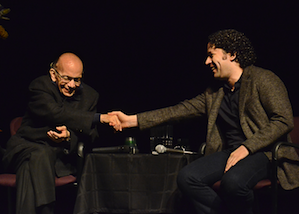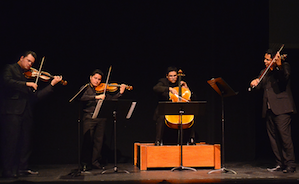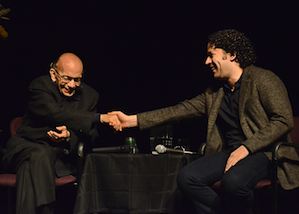
Photos by Peg Skorpinski
At "Reaching for the Stars," last week's international conference on music education at UC Berkeley, headliners included El Sistema founder José Antonio Abreu, Gustavo Dudamel, and the hosting Cal Performances Director Matías Tarnopolsky.
"I dropped in to hear them talk and, as expected, the words were inspiring. But, as happens often with music, you can go to hear one thing and be surprised by another. And so it was with this," writes Karen Ames:
Just prior to Dudamel and Abreu, the audience got to meet Stanford Thompson. The Curtis graduate, a talented musician and trumpet player, Stanford shared a story of finding himself highly trained with a dream to play in the Philadelphia Orchestra. After a stint in Kenya to found a small program based on El Sistema, he was accepted as a fellow at the New England Conservatory’s El Sistema fellowship.And then he took these skills back to Philly and founded "Play on Philly," an after school program based on the principles of El Sistema. Yes, the story is amazing, but the man himself was even more amazing. Hearing him talk with humility and humor about his path and the challenges brought tears to my eyes.
I’m sure there was an easier — and certainly more lucrative — path for this incredible young musician, but I’m not sure any of those paths would have touched so many people or changed as many young lives. The kids are learning to play and experiencing great guests like Simon Rattle and Bobby McFerrin, but Stanford is also gathering data that proves his kids are also getting better grades and becoming better overall citizens. Stanford chuckled when he shared that each year the program sends the mayor of Philadelphia a bill for all the kids they've kept out of juvenile hall.

There were many enthusiastic reports about other presentations as well, and such gems from Abreu as "A child with an instrument is no longer a poor child. A child with an instrument and teacher is no longer an excluded child."
And, as the SFCV interview with Tarnopolsky last week quoted him on what is being done ... and what is not:
[The education gap] has long been filled, at least partly, by arts organizations like ours or the San Francisco Symphony, which has its [own] education program, by sending performing artists out to the schools or [connecting] kids with performing artists. Our education program [at Cal Performances] is part of our DNA.We do in excess of 60 education and community programs every year, mostly free. Ten of those are main stage performances at Zellerbach Hall during the school days. So that’s 2,000 kids each time. And in advance of every one of those performances our teaching artists go into the schools and work with both kids and teachers to prepare them for the performances. And then, afterwards, often the artists will interact with the children.
But that’s still not the same as music being part of the curriculum. As a very dear composer friend of mine said to me, “Why is it that the swim team meets at 7 a.m. every morning and not the orchestra or the band?” That’s what we must get to.

